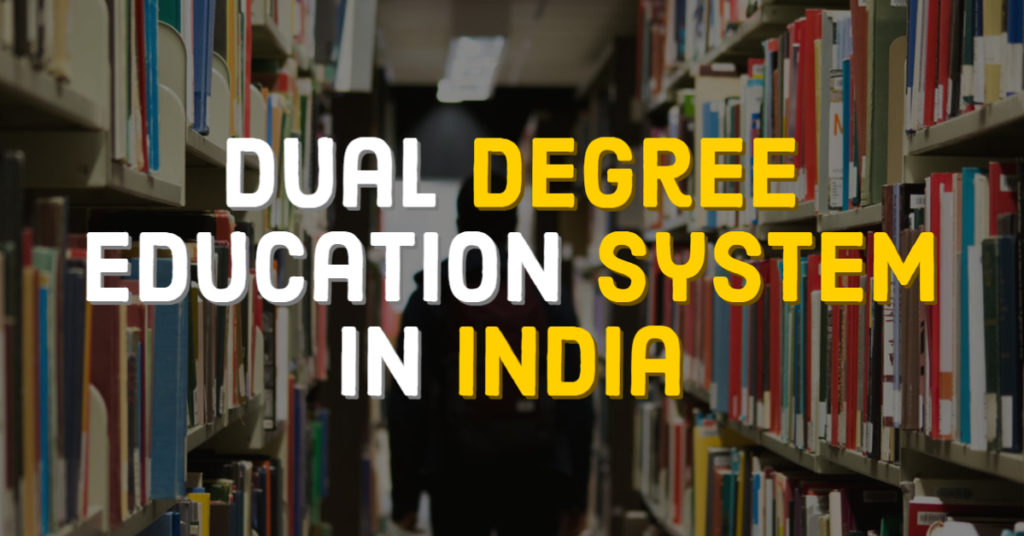In today’s era, all HEIs have a pressing need to deliver outcomes, which in most cases, is employment. Most employers are sure that undergraduate education delivered by the Universities / Colleges does not produce the type of workers that the industry requires. Getting students to meaningful employment is one of the paramount goals of higher education. Dual degree education in India evolved to cater to the present requirements.
Education is the passport to the future, for tomorrow belongs to those who prepare for it today.
Malcolm X
A double degree program, sometimes called a dual degree, involves a student working for two university degrees in parallel, either at the same institution or at different institutions (sometimes, even in different countries) and completing them in less time than it would have taken to earn them separately. The two degrees might be in the same subject area, or in two different subjects [1].
Undergraduate double degree programs are generally found in countries, whose higher education systems follow the British model. Master’s double degree programs are more widespread. Typically, in a double degree program, both of the participating institutions reduce the amount of time required to be spent at each. Common undergraduate double degrees include Engineering – Economics programs, Engineering – Business programs, such as Business and Computing etc. They often take 4–5 years to complete instead of 7–8 years to complete the degrees separately. Common postgraduate double degrees are Law–MBA degrees, as well as degrees combined with MA fields, such as politics, economics, urban planning, and international relations. Many medical schools also offer joint MD degrees with Law and MBA programs, as well as with a range of MA programs. Some universities even offer dual PhD / MBA degrees, where the PhD portion is generally in science and/or engineering, to target entrepreneurs and venture capitalists [1].
The double degree program allows one to pursue two different courses together and get the experience of both in lesser time than it would have taken to study them one after the other. Students usually go for options like B.Tech. and MBA so that they are complete by the end of the course. Thus, they end up saving at least one year for themselves in which they can advance their career by taking up a job.
The double degree program allows one to pursue two different courses together and get the experience of both in lesser time than it would have taken to study them one after the other.
Curriculum Structure
Double degrees should not be confused with double major or with the occasional practice of awarding a further qualification with a worked-for (especially research) degree, nor with the awarding of a single degree by multiple institutions. Double majors or dual majors consist of two majors attached to a single degree, as opposed to two separate degrees, each with its own field of study. In some schools, students will earn a double major when the two majors lead to the same degree name (such as BA, BS, BFA) and they will earn a double degree when the two majors lead to differently-named degrees (such as BA and BM, BS and BFA). In general, the number of hours and required courses are more in a dual-degree program than a double major [1].
The curriculum for the dual-degree program is roughly the same as the combined requirements of the undergraduate (say, B. Tech.) and postgraduate (say, M. Tech.) curriculum. All requirements such as core courses will be adhered to. Since there is a reduction in the time, a small amount of reduction from the combined requirements is done. Here is an example of the course structure of a 5-year double degree (B.Tech + M.Tech) program,
- First three years: Identical to the existing B. Tech. program
- 7th semester: 1 HSS course, 4 Departmental Electives (at least one PG elective)
- 8th semester: 4 PG Electives and 4 units of M. Tech. thesis
- Summer semester: 4 units of M Tech. Thesis or Summer training
- 9th semester: 1 PG elective and 12 units of M.Tech. thesis
- 10th semester: 16 units of M. Tech. thesis
Dual Degree Vs Integrated Degree
Unlike in dual degree, a student gets a combined degree certificate on completion of an integrated degree. The revolutions of education in India brought about many alterations in the subjects and the way programs were structured and integration of courses was one of them [3]. Integrated degree programs are offered by a wide range of universities in India and across the world. A student can join these courses right after class 12 and get a higher degree in less time. Such degrees are completed typically in 4-5 years, depending upon theory and practical semesters.
Unlike in dual degree, a student gets a combined degree certificate on completion of an integrated degree.
Dual Degree Programmes in India
Dual Degree courses benefit the student by completing two degrees in comparatively lesser time. This concept of dual degree was first introduced in India by the Indian Institutes of Technology (IITs). Such 5-year dual degree programs are already in place in various departments of IIT Kanpur, IIT Bombay, IIT Delhi, IIT Madras, and IIT Kharagpur [2]. IISc Bangalore offers an integrated doctoral program in biology, chemistry, mathematics, and physics to talented bachelor-of-science and engineering graduates [3].
The Indian Institutes of Technology (IITs) offer five-year integrated Master of Science (M.Sc.) & Master of Arts (M.A.) programs, dual degree programs, and integrated M.Sc. / Ph. D. programs are also offered.
The National Law School of India University (NLSIU) offers a five-year combined Bachelor of Art (BA) / Bachelor of Laws (LLB (Hons.)) degree program. Most of the more recently established National Law Universities (NLUs) offer similar degree structures.
The Indian Institute of Space Science and Technology (IISST) offers a five-year integrated master’s program in Applied Sciences (M.Sc) with special emphasis on space-related subjects [3].
University of Hyderabad has a complete department dedicated to integrated programs called College for Integrated Studies and offers courses like M.Sc. (5-year Integrated) Programs from the Science Schools, M.Sc. (5-year Integrated) Earth Sciences etc.
Being introduced in India first by the pioneer IITs, dual degree programs have now become popular across many colleges and universities like, VIT Vellore, TIET Patiala, BITS Pilani, SRM University Chennai, Amity University, Noida, University of Rajasthan, Punjabi University, Delhi Technological University, Guru Gobind Singh Indraprastha University, Jawaharlal Nehru Technological University Hyderabad and many more.
Dual Degree Programmes in Foreign Countries
In the United States, a dual degree program is based on a formal agreement within one college/university or between separate colleges/universities. After completing all requirements for both programs (usually in four to five years) the student is awarded two degrees in one of the following combinations:
- Associate’s and Bachelor’s programs – an associate degree from a community college and a bachelor’s degree from a partner university;
- Dual bachelor’s degree programs – two bachelor’s degrees;
- Dual Bachelor’s master’s degree programs – a bachelor’s degree and a master’s degree;
- Dual Graduate Degree programs – a combination of DDS, PharmD, DO, MA, MD, MPP, MS, JD, MBA, MPH, or PhD.
One specific example of a dual bachelor’s program is the 3-2 engineering program, which most often takes the form of a student completing three years of study at his or her original institution, often a liberal arts college, and then going to a partnered research university for two years to complete an engineering degree.
In Canada, Australia, and increasingly Hong Kong, many teacher candidates study simultaneously for a Bachelor of Arts and a Bachelor of Education. These are known as “concurrent-education” programs.
Some examples of dual degree programmes in other countries are given below.
a.) Undergraduate Programs
- Canada – University of Waterloo & Wilfrid Laurier University offer two double degree programs spanning both schools (located just minutes from each other). Students are able to obtain a Bachelor of Business Administration from Wilfrid Laurier University and either a Bachelor of Mathematics or a Bachelor of Computer Science from the University of Waterloo. [1]
- France + Canada offer a dual bachelor’s degree between Sciences Po and the University of British Columbia – a Bachelor of Arts from Sciences Po and either a second Bachelor of Arts or a Bachelor of Commerce from the University of British Columbia [1].
- Indonesia – Universitas Indonesia & University of Newcastle offer a double degree program. Universitas Indonesia was among the first universities in Indonesia to offer a double degree program. This was earlier introduced into their Faculty of Medicine through the 3+1 scheme. Other faculties in Universitas Indonesia such as Law, Engineering, Communications, and Business are in collaboration with the National University of Singapore, University of Queensland, University of Birmingham, and University of Groningen respectively. Therefore, students have the flexibility to decide where they would like to complete the remaining time of their studies according to their qualifications, GPA, and interests [1].
- Mexico – Autonomous University of Nuevo León & Japan‘s Nagaoka University of Technology offer such programs wherein undergraduate alumni of Mexican Institution enrolled in Civil Engineering are able to obtain their respective Japanese degree attending the final two years of study to the respective Japanese university [1].
- Netherlands – University of Amsterdam provides double bachelor programs (DuBa) for certain Bachelor of Sciences (Bsc.), leading up to two separate bachelor’s degrees. These include a double bachelor for Mathematics and either Physics or Computer Science, and a double bachelor for Medicine and Biomedical Sciences [1].
b.) Graduate Programs
- Denmark – Copenhagen Business School & Italy‘s – Bocconi University offer a limited number of double degrees. Each year three highly competitive spots are offered for students to apply for a Double Degree in the Management of Innovation and Technology between CBS and Bocconi. [1]
- France – Many double degree programs exist in France especially with the collegiate universities such as Paris Tech. One of its most famous programs is the double degree in engineering and management delivered by the École Polytechnique and HEC Paris [1].
- Netherlands – University of Groningen & United Kingdom‘s – Newcastle University provide students with the opportunity to study at Newcastle University and the University of Groningen.
- United States – University of Houston provides numerous double degrees, including double degrees for Juris Doctor and Master of Business Administration, and double degree for Master of Social Work and Master of Public Policy [1].
Analyses
The need for such dual degree programs has been felt in recent years with declining strength of PG programs. With the boom in the economy, the salaries for engineers, particularly in the area of computer science, have skyrocketed, and are incomparable to the M. Tech. stipend. Furthermore, the huge demand in software industry for software engineers has led to the hiring of graduates from institutions that traditionally provided inputs for M. Tech. program. The situation implies that it is unlikely to attract a large number of good students to M. Tech. or PhD programs. For similar reasons, it is also very unlikely to attract reasonable quality graduates to work as research engineers. The fallout of this is that in Computer Science, with the current setup, there is very little research manpower.
With the boom in the economy, the salaries for engineers, particularly in the area of computer science, have skyrocketed, and are incomparable to the M. Tech. stipend.
The dual degree programs are being designed to make it attractive for a good student to do an M. Tech., and thus contribute to the research efforts of the department. The student benefits by getting an M. Tech. degree with just one year of extra effort, thereby saving at least six months. The popularity of similar programs can be judged by the fact that IIT Bombay has steadily increased its intake in a five-year dual degree program, and now more than one-third of the students admitted through JEE are in such programs. Good quality M. Tech. students are also expected to give a boost to undergraduate education since they help undergraduates in labs, and interact with them as teaching assistants.
More than one-third of the students admitted through JEE are in dual degree programs
The dual-degree program is being proposed instead of an integrated 5-year M. Tech. program, as the B. Tech. degree is the hallmark of IITs, and without offering this, the interest in the program will be low. Dual degrees are really worth it if one is going to continue in the branch one chooses. The main reason for it is that IITs are not liberal in the course work. There are a lot of courses which are compulsory [2]. If we compare Dual and B. Tech. in the same department, say Dual (CSE) versus B. Tech. (CSE), then the answer is very simple. Though dual-degree programs are fantastic, it would be better to go for B.Tech and convert it into a dual degree during the course of B.Tech, if research interests a student. An early commitment to research, without exploring the field, is not recommended.
Dual Degree is generally more suited for students who want to pursue higher studies and research work in the future. Dual degree programs allow one to achieve double in academics in half the time it would have taken you otherwise. Dual degree courses in India have become a big hit because of the multiple advantages attached to them. As mentioned before, a dual degree program allows one to complete two degrees in less time which means one also saves on the money involved in lodging and tuition fee. They also open up better job options as the companies find it perfect that a candidate comes trained in different areas like management and technical skills. Needless to say, one has the option to make a career in one field itself and can take up a dual degree program if one is confused between two courses.
An early commitment to research, without exploring the field, is not recommended.
They might sound like a big deal and something tough to do, but dual degrees enable candidates to accelerate their learning in different subjects and are very well structured for the benefit of students. One will stand out during the placements as the companies will always want to choose someone with a good understanding of two disciplines rather than a student who has to be trained in one [3, 4]. The advantages of dual degree programs are as follows.
- It helps students to complete two degrees in a shorter span of time.
- It also costs less in terms of fees and other educational expenses.
- It offers scope for research or higher degrees like another Masters or a PhD.
- It can also help the students to increase their network as they get to meet many students, people, academicians, and professionals.
The disadvantages of dual degree programs are as following [4].
- The biggest challenge is that the students have to take the pressure of both the courses and degrees and the sudden transition from one course to another may not be easy for everyone.
- The dual degree course restricts the choice to change the college if the student wishes to do so after completion of one degree.
The roots of education are bitter, but the fruit is sweet. Challenges of pursuing a dual degree program
Aristotle
A dual degree will mean more hard work without any doubt. One has to be on the toes if he/she wants to justify his / her decision of taking up such a program. The challenges will be different and need unmatched concentration. One needs constant motivation otherwise this will be a huge miss and the student will be under immense pressure to keep head above water throughout the semester [3].
They might sound like a big deal and something tough to do, but dual degrees enable candidates to accelerate their learning in different subjects and are very well structured for the benefit of students.
In conclusion, dual degree programs are the current requirements of the industry. It is a knowledge centric society today, therefore dual degree programs are the right choice. However, the choice of the institution offering it will be very vital for decision making.
The best way to predict the future is to create it.
Abraham Lincoln
References
Acknowledgement
The author thankfully acknowledges all with gratitude, referred to herein, in creating this eclectic article. Also, author’s views have also been inserted, as and where needed.
Disclaimer: The views expressed in this article are of the author solely. TheRise.co.in neither endorses nor is responsible for them.
About the author
Prof. Yaduvir Singh is Professor of Electrical Engineering at School of Engineering, HBTU, Kanpur. Prof. Singh had been the Dean (Planning & Resource Generation), HBTU Kanpur.









Quite informative
Very good article for study and career planning. – Sukhwinder Gill